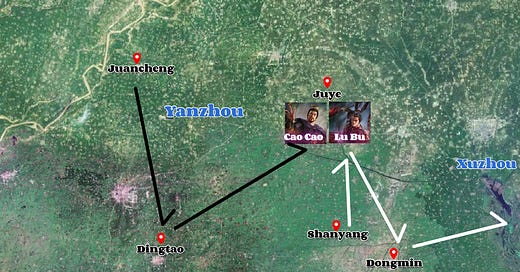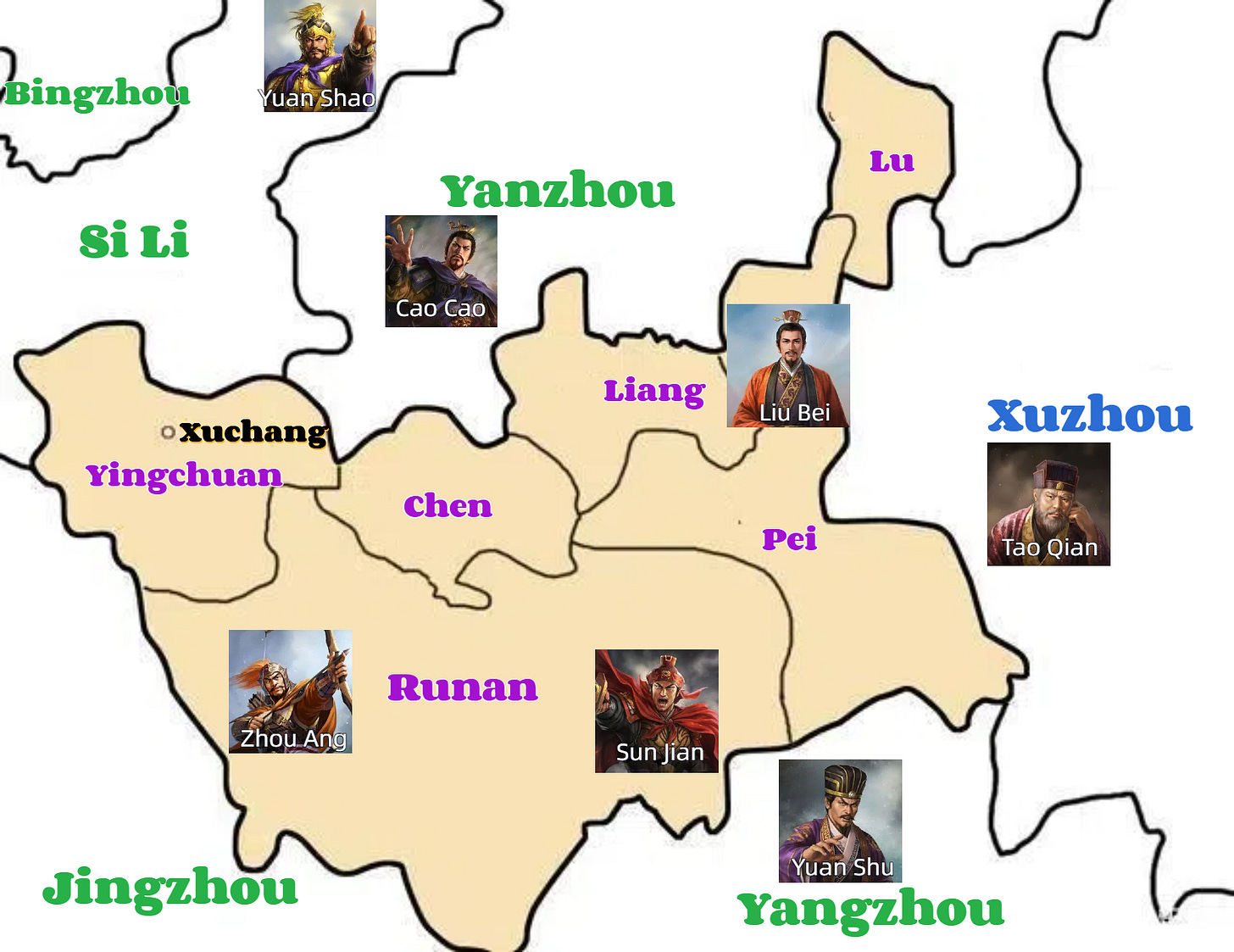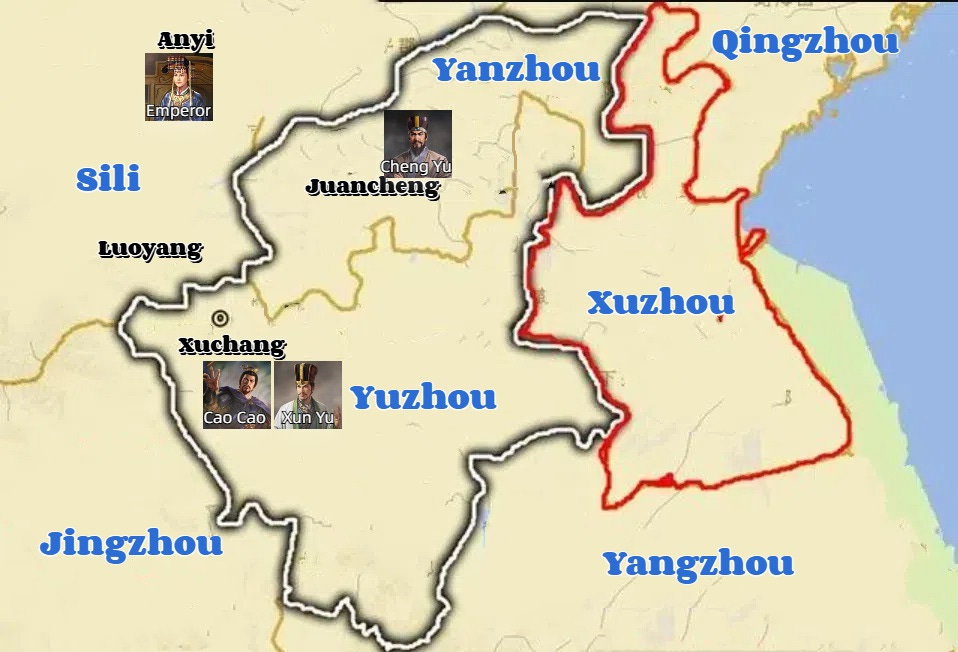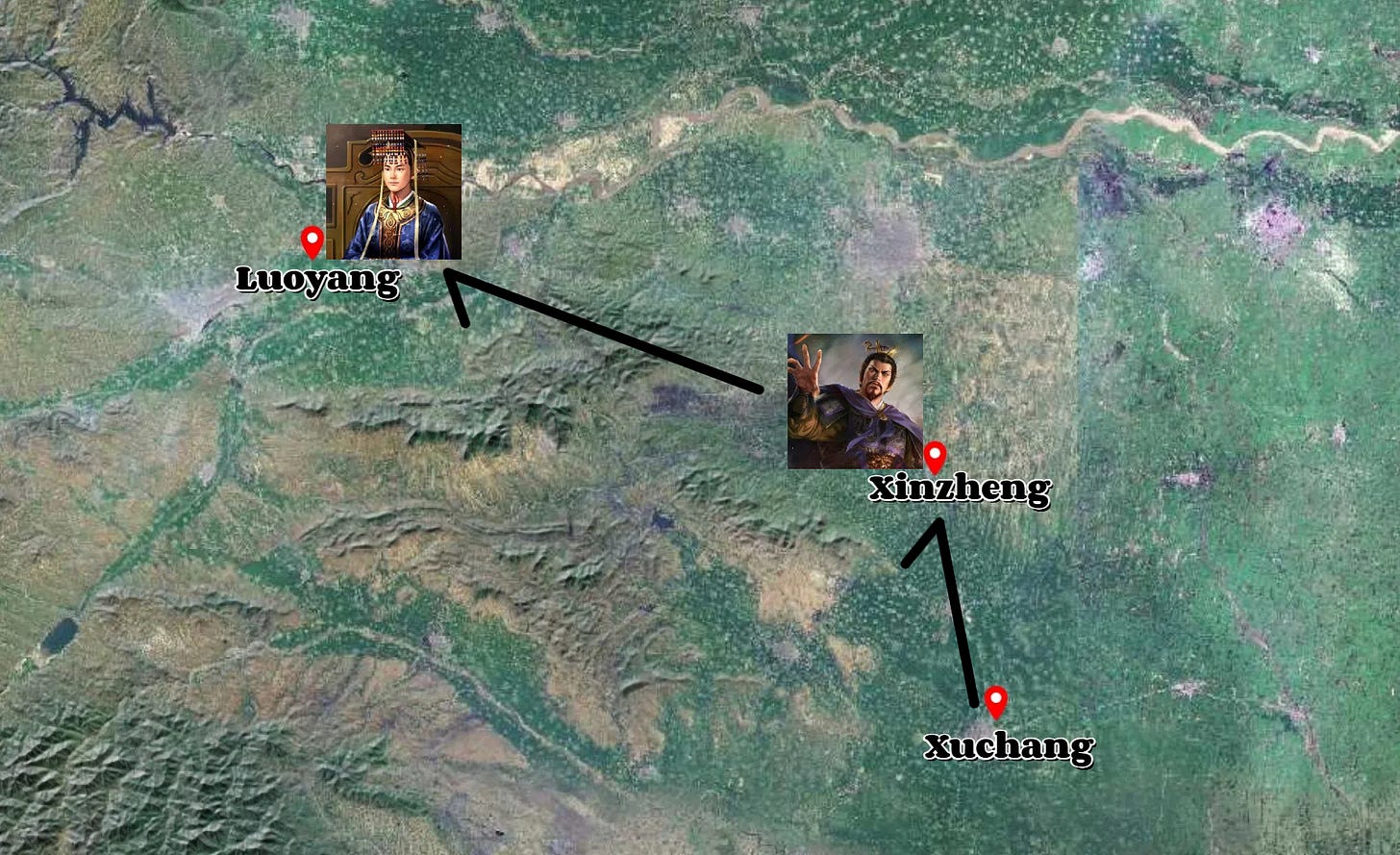Cao Cao - Holding the Emperor to Order the Lords
Three Kingdoms 120 (Special - Review of Cao Cao's Life 5)
In the spring of 195 A.D., Cao Cao曹操 overcame famine and regrouped to attack Dingtao定陶, but was met with stubborn resistance from Lu Bu's subordinate. Lu Bu吕布 hurriedly came to rescue from Shanyang山阳, so Cao Cao made up his defense to confront him, and after a fierce battle, he finally defeated Lu Bu greatly.
In the summer of the same year, Cao Cao once again used the strategy of "besieging the city to lure the reinforcements",he surrounded Lu Bu's city of Juye钜野,Lu Bu once again rushed to rescue , but was once again defeated, and had to retreat to Dongmin东缗, where Juye city was immediately captured by Cao Cao.
Seeing that he was no match for Cao Cao, Lu Bu began to gather his troops, intending to throw his weight around and fight a decisive battle with Cao Cao.
In the summer of the same year, the wheat in Yanzhou was ripening, and Cao Cao hurriedly sent his soldiers out of the city to harvest it. Lu Bu seized the opportunity and came to attack with Chen Gong陈宫 and Zhang Miao张邈 with over 10,000 men.
At the time, Cao Cao had just built a temporary battalion, the fortifications of which had not yet been completed and could not be used for defense, and there were fewer than 1,000 men left in the battalion.
Upon hearing of Lu Bu's attack, Cao Cao hastily recruited a group of women from the neighborhood to guard the battalion walls.
If Lu Bu chose to attack at this point, the odds are that Cao Cao would have suffered a crushing defeat, and possibly even died when the battalion was captured. However, the tactical style of military maneuvering over the years helped Cao Cao at this point, and Lu Bu, like Liu Bei later on, was so scared that he actually began to be suspicious in a situation where he had the advantage.
At that time, there was a large thick forest to the west of Cao Cao's battalion, and Lu Bu inexplicably suspected that there was an ambush within the forest. He said to his men, “Cao Cao is a man who has always been treacherous, we must not fall into his ambush!” Therefore, he decided to temporarily station his troops a dozen kilometers away from the south gate of Cao's battalion and wait until the next day before slowly advancing forward.
But Lu Bu did so, giving Cao Cao time to react. He recalled his main force harvesting wheat outside of the city overnight, and separated half of his troops to hide in the forest.
Early the next morning, Lu Bu came to attack with his troops, while Cao Cao personally led the remaining troops out of the city to engage, and when the two armies were killing each other, the ambush soldiers suddenly came out, and Lu Bu was defeated, only fleeing to Xuzhou徐州 with Chen Gong and Zhang Miao in a mess and seeking refuge with Liu Bei.
Cao's army who said goodbye to hunger could not be stopped any more, and soon recovered the whole province of Yanzhou兖州.
In October of the same year, Emperor Xian of Han汉献帝(reign189-220AD) sent an imperial edict officially appointing Cao Cao as the Provincial governor of Yanzhou, and the people of Yanzhou were finally able to say goodbye to the chaos and return to a peaceful life.
If you are talking about the complexity of the situation, Yuzhou豫州 province to the south of Yanzhou can be said to be second only to Yanzhou. It was sandwiched between the forces of Yuan Shao袁绍, Cao Cao, Tao Qian陶谦, Yuan Shu袁术, Liu Biao刘表 and other factions, and the war here was constant.
Especially after the crusade of Dong Zhuo董卓, the original provincial governor of Yuzhou, Kong Zhou孔伷, died of illness. In just a few years, the governors of Yuzhou kept changing, and there was even a miraculous phenomenon of several governors co-existing.
In order to cultivate their power here, various warlords sent their subordinates to serve as the provincial governor of Yuzhou. For example, Sun Jian孙坚 was appointed by Yuan Shu, Zhou Ang周昂 was appointed by Yuan Shao, Liu Bei was appointed by Tao Qian, and Guo Gong郭恭 was appointed by an unknown person.
These Governors had set up their own capitals, arranged officials, and conquered each other, plus hundreds of thousands of Yellow Turban peasants army and bandits in the mountains and forests , Yuzhou was in a mess.
In the first month of 196 A.D., Cao Cao ended his rest and led his army into Yuzhou, where he began to quickly sweep away the various factions entrenched there. Many forces heard of Cao Cao's reputation that they either fled or surrendered.
Cao Cao quickly pacified the Yingchuan颍川 commandery, where Xuchang许昌 was located and his most important strategist &partner Xun Yu's荀彧 hometown, and the Runan汝南 commandery, the hometown of the Yuan Shao and Yuan Shu brothers, purged the various Yellow Turban rebel armies that had followed Yuan Shu's lead.
Cao Cao's army won many victories along the way, and local Yellow Turbans leaders led tens of thousands of their men to surrender. Yuan Shu's forces were expelled to the south of the Huai River淮河, thus Cao Cao took control of almost all of Yuzhou.
At the suggestion of Xun Yu and others, Cao Cao left his trusted man Cheng Yu程昱 to guard Jancheng鄄城, the capital of Yanzhou, and oversee all the Yanzhou affairs, while he moved his headquarters to Xuchang, the capital of Yingchuan commandery.
In June of the same year, Liu Xie刘协, Emperor Xian of Han, escaped from the control of Li Jue李傕 and Guo Si郭汜 and fled from Chang'an and settled in Anyi安邑. In order to gain favor with Cao Cao, a powerful force among the many warlords in the Central Plains, he sent an envoy to promote Cao Cao to the rank of General of Guarding East and bestowed the title of Marquis of Fei Village费亭侯 on him.
Both Mao Jie毛玠 and Xun Yu荀彧 had previously suggested to Cao Cao that he should greet the Emperor. So back at the beginning of the year, Cao Cao had sent Cao Hong曹洪 to lead an army to greet Emperor Xian. However, the main roads to the west was separately occupied by Dong Cheng董承, an important official of the emperor, and some Yuan Shu's men, so Cao Hong was unable to pass through and had to return.
Now that Yuan Shu's forces had been driven out of Yuzhou, and after arriving in Luoyang洛阳, Dong Cheng was interested in joining forces with Cao Cao because he wanted to increase his own strength.
However, Cao Cao's army was running out of provisions after a series of consecutive battles, but in order to capitalize on this fleeting opportunity, Cao Cao took the risk of marching into Luoyang in July of the same year.
But as they traveled along the road, Cao Cao's army broke off their food. Cao Cao understands that letting his soldiers rush forward hungry is a terrible thing, and the risk of a mutiny is very high. But now that the bones are everywhere, and the whole country is deserted, where should they raise food?
Just when Cao Cao was once again in desperate straits, Yang Pei杨沛, the magistrate of Xinzheng新郑 County, ordered several dozen tons of dried mulberries and wild beans to be sent to Cao Cao to relieve his immediate needs. The whole army relied on this life-saving food to reach Luoyang.
Cao Cao was then authorized by Emperor Xian with the power of "Jiajie”(假节,have the power to represent the Emperor) and “Taking Control of the imperial secretariat”(录尚书事The power to control the Empire’s decision-making body ).
In September of the same year,under the planning of Cao Cao's strategist Dong Zhao董昭, Cao Cao succeeded in relocating Emperor Xian and his officials to Xuchang, where he was appointed as General-in-Chief大将军 and given the title of Marquis of Wuping(county)武平(县)侯.
Fifty years earlier, Cao Cao's grandfather, the eunuch Cao Teng曹腾, had been awarded the title of Marquis of Fei Village by Emperor Huan of Han(汉桓帝,reign146-168AD). After Cao Teng's death, Cao Song曹嵩, Cao Cao's father, inherited the title of Marquis of Fei Village, so Cao Cao's previous title of the less impressive Marquis of Fei Village had a special significance for Cao Cao as a successor to his ancestors.
But now that Cao Cao had become a Marquis of County(Wuping), two ranks higher, it also meant that his power, as it were, was far beyond that of his father and grandfather.
From this year onward, at the age of 42, Cao Cao will have a unique way of raising the fallen Han Empire and creating an era of his own.







